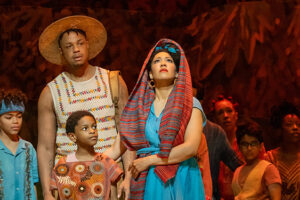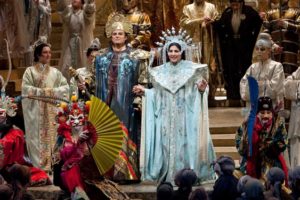

Korngold is probably best remembered for the Hollywood movie music he wrote in the 30s and 40s, but he first gained attention as a child prodigy. Born in 1897 in Brno, in 1901 he and his family moved to Vienna, where his father, Julius, succeeded Eduard Hanslick as music critic at the Neue Freie Presse. After he composed his first piece at age 8, Papa encouraged Erich’s talent, introducing him to the right people, including Mahler, who arranged for the boy to study with Zemlinsky.
Erich’s work was well received—Artur Schnabel premiered his Piano Sonata No. 2, written when the boy was fourteen, and five years later Bruno Walter conducted the successful premiere of his two one-act operas, Der Ring des Polykrates and Violanta. His third opera, Die tote Stadt, premiering in 1920 when he was only 23, was an instant hit.
He continued to compose instrumental works while working as music director and conductor at the Hamburg Opera. He also began arranging operettas for the producer Max Reinhardt, a connection which would prove life changing.
Korngold wrote his third opera during the happy period after his marriage to Luzi. In the months before it opened Korngold’s father again stepped in to promote his son’s career. Julius knew of the imminent premiere of Ernst Krenek’s Jonny spielt auf, a “jazz opera” contrasting dramatically with Heliane’s more romantic style, and he launched a bully campaign to sink it, publishing screeds meant to create a backlash against the edgier modern work.
But instead his polemic provided free publicity for Jonny, which enjoyed greater success than Heliane, which disappeared after a revival in Berlin in 1928. Ironically, both operas were later condemned by the Nazis as “Entartete Musik,” so-called degenerate music.
Korngold continued to maintain an active career teaching and composing in Vienna. But Vienna was becoming an awkward place for Jews, and when Max Reinhardt, now living in Hollywood, approached him in 1934 to create the music for a film version of A Midsummer Night’s Dream, Erich had the good sense to take him up on the invitation. His lavish, exuberant style proved a good fit for Hollywood’s early swashbucklers, and Korngold won two best score Oscars.
He stopped writing for the movies after a heart attack in 1948, and he died in Hollywood in 1957. (Krenek, whose Austrian career foundered because of his so-called degenerate style, left Vienna for the US in 1938, teaching composition in colleges to support his creative career. He moved to Southern California in 1948 and spent another 40 prolific years until his death in 1991. One wonders whether the two ever overcame their earlier rivalry to meet in America)
Back to Heliane: the libretto is based on a symbolist play by Hans Kaltneker, adapted by the poet Hans Müller, and revolves around a man who yearns for his wife’s love. In an unnamed land in medieval times, a tyrannical, elderly Ruler demands that his people forego love and happiness, because his wife, Heliane, does not love him. A Stranger comes to the land preaching joy and freedom; for this the Ruler imprisons him, and condemns him to death.
When Heliane goes to comfort the prisoner, she is attracted to him, and yields to his request to show him her long hair, then her feet, then finally her body. After she drops her dress, he begs her to yields to him, but she refuses and repairs—still naked—to a nearby chapel to pray (as one does).
The Ruler again visits the Prisoner and offers to spare his life and even to share Heliane with him if the latter can teach the Ruler to gain her love. When Heliane returns to the prison cell, the enraged Ruler withdraws his offer of clemency and orders his wife to be tried for adultery as well.
The Messenger—once the Ruler’s mistress—summons the judges to trial, and the Ruler accuses Heliane of adultery. She denies betraying her husband, but the Ruler hands her his dagger and demands that she kill herself. The Stranger refuses to testify, and asks for a word alone with Heliane. After a farewell kiss, he grabs the dagger and stabs himself. The Ruler says Heliane may save herself by performing a miracle: reviving the Stranger from the dead.
In the final act, when Heliane changes her story and says that she did love the Stranger, the Ruler hands her over to the people who once loved her, now an angry mob. As they prepare to drag her to the stake, a thunderbolt reveals the Stranger returned to life. Enraged, the Ruler stabs Heliane, and the two lovers are united forever in death.
The melodramatic narrative, echoing love triangles like Tristan und Isolde and Pelléas et Mélisande, lurches with the heated plot twists of a soap opera. We hear every affective nuance in the music, beginning with a heavenly chorus (offstage) proclaiming, “Blessed are they who love,” before the music turns sinister, ecstatic, and cataclysmic by turns. With intense emotions depicted nonstop, it all becomes a bit much. But the harmonic language and orchestration are interesting, and ultimately the score is a glorious if guilty pleasure.
Arguably, composers like Wagner, Puccini, Richard Strauss, and Mascagni paved the way for this luxuriously expressive style of operatic composition, where music closely reflects words, actions, and feelings unconfined by the formal conventions of earlier opera. As far as I know, however, only Mascagni wrote an actual film score, for the 1915 silent movie Rapsodia Satanica.
The scenario shares the overt eroticism of other works of its time, like Hindemith’s 1922 Sancta Susanna and Szymanowski’s 1926 King Roger. Bösch’s austere, scorched earth production, with dramaturgy by Barbora Horáková Joly, dwells less on sex and more on the power exercised by an impotent ruler (perhaps literally impotent), and the fickle loyalties of his subjects.
He updates the setting to a vaguely contemporary wasteland out of a Mad Max movie (sets and costumes by Christof Hetzer, lighting by Michael Bauer). Spotlights penetrate the misty shadows and there are almost no props. A downtrodden populace in filthy shapeless rags and bad hair move listlessly about the stage.
Wearing combat boots and a grubby cotton shift, Heliane (Ausrine Stundyte), first seen crouching on the frame of a tattered billboard upstage, looked like an escapee from Bedlam. Her husband, the shaved-headed, perpetually scowling Ruler was here a man in his prime, showing off a deep scar on his bare chest as he stomped around the rubble brandishing a sawed-off shotgun.
His perpetual bad temper and hair-trigger decisions didn’t make much sense, but a program note suggested that Bösch wanted to allude to modern politics while still presenting a straightforward reading of the unfamiliar work.
Dressed in baggy pants and a dirty singlet, with his gray buzz cut and blood-smeared dad bod, Ian Storey didn’t quite muster the acting chops to convey the seductive allure of Müller’s proto-hippie Stranger, but his gentle dignity signaled an attractive inner beauty and sincere attachment to Heliane, and his sweet but powerful tenor negotiated the punishing part with virtually no strain.
Certainly Stundyte generated enough heat for both of them. The Latvian soprano has earned an avid following for her gripping performances of dramatic soprano and occasionally mezzo roles; her voice seems made of very separate registers, but she deploys her wide range and broad palette of vocal colors expressively. A real stage animal, she was utterly magnetic, embodying with posture and energy the difference between a longing gaze at the Stranger and a stand-off with her husband.
In her big second act monologue, “Ich ging zu ihm,” she resisted the temptation to wallow in vocal creaminess, instead conveying a bittersweet memory of temptation and longing with more subtle means.
Tómas Tómasson’s Ruler exuded menace and vocal authority; incongruously, there was more erotic charge between him and Heliane, and between the Ruler and the Messenger than between Heliane and the Stranger. Metal-voiced mezzo Natascha Petrinsky’s charisma and engagement gave the Messenger greater prominence that the libretto would suggest.
Tenor Denzil Delaere, a member of the young artist program, lent a clarion tenor to the role of the Blind Judge, and his fellow young artist Markus Suihkonen as the Jailer displayed an authoritative stage presence and a strong bass voice.
The Opera Vlaanderen chorus ably handled their prominent ensemble parts; despite third act blocking that required them to move like zombie line dancers, they muster enough conviction to carry it off. The children’s chorus sounded heavenly. Company music director Alexander Joel paced the performance nicely and commanded disciplined playing from the Opera Vlaanderen Symphony Orchestra.
If you’ve never heard the opera, do listen to the 1992 recording by the RSO Berlin, with Anna Tomawa-Sintow; the two principal men are less persuasive, but secondary roles feature Rene Pape, Nicolai Gedda and Reinhild Runkel.
Photos: Annemie Augustijns
























Comments